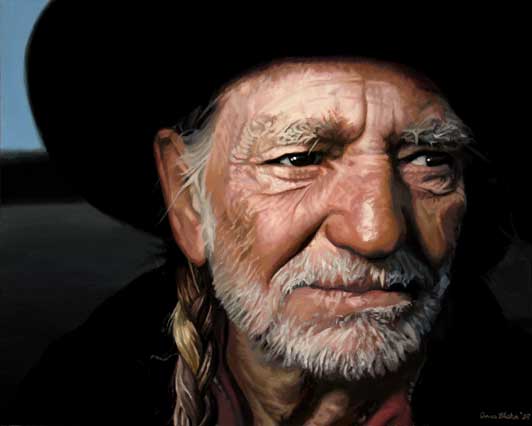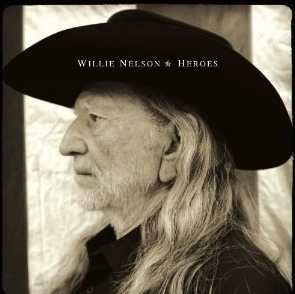The Homecoming
By David McGee
HEROES
Willie Nelson
Legacy RecordingsSay this for Willie Nelson: age hasn’t diminished his penchant for being resourceful and surprising. Heroes is the first fruit of a sweeping new deal he’s struck with Legacy Recordings. It returns him to the home of Columbia Records, where he fashioned a breathtaking and daring catalogue that includes his groundbreaking Stardust album, the awesome hot swing of Somewhere Over the Rainbow, and the monumental concept album Red Headed Stranger, to cite but a trio of the exceptional long players he released in his first go-‘round with the label, between 1975 and 1993 (he went out in style in ’93, too, with Across the Borderline). At Columbia, once Bruce Lundvall gave him the hi sign for Red Headed Stranger in 1975, Willie threw caution to the wind and followed his expansive instincts to wherever they would lead him, hence the ensuing genre jumping classics . In rejoining the Sony family, he’s also returning to the company that now owns RCA as well, where Willie enjoyed a fruitful, if not commercially rich, tenure between 1965 and 1972. As part of this homecoming deal, Willie is contracted not only for new recordings but to personally curate the release of material from his vast archives. All signs point to this being a win-win proposition for artist and label, beginning with Heroes.
Willie Nelson discusses his Heroes albumIt’s not so much that Willie sounds rejuvenated here; he has a way of fitting in whenever he heads to the studio, no matter who’s producing or playing. Consequently he doesn’t make bad albums; he may sound more inspired on some than on others these days, but even when everything isn’t totally square, he has a way of making you like what you’re hearing, unless you simply will not tolerate any Willie that isn’t The Red Headed Stranger or Phases and Stages. Or Stardust. Well, Heroes isn’t any of these monuments, but the more you live with it, the more you’re likely to love its easygoing ambience and carefree attitude, the artists’ real commitment to the songs, the empathetic arrangements and the spirited musicianship.
Willie and Lukas Nelson perform Lukas’s song ‘No Place to Fly,’ from HeroesOn the surface Heroes wouldn’t seem to offer much in the way of surprises. As is his wont, Willie dips into his songbook for some old chestnuts (he kicks things off with a duet with his stalwart partner Merle Haggard on Wayne “The Letter” Carson’s heart tugging tale of lost love on the high plains, “A Horse Called Music,” the title track from Willie’s 1989 Fred Foster-produced album for Columbia, here set in understated solemnity courtesy the sensitive, elegiac soundscape dominated by Mickey Raphael’s tearful harmonica, Jim “Moose” Brown’s reverent B3 hums and Bobby Terry’s spare acoustic guitar touches), but he also has a couple of news songs to offer, and he makes of the album a coming out party for his son Lukas, who contributes three original songs, and also plays electric guitar and sings on nine tracks in all; Willie’s son Micah also gets into the act, less so than his more established brother but enough to make an impression. In addition to Hag—whose vocal on “A Horse Called Music” is a wise and weathered gem, by the way—Willie calls on Kris Kristofferson, Billy Joe Shaver, Jamey Johnson, Sheryl Crow and Snoop Dogg, of all people, to lend a hand. The big surprise here is not that Kris, Billy Joe and Jamey are up to the task, but that Sheryl Crow isn’t and Snoop Dogg almost steals the show. Crow joins in with Willie and Lukas on a gently pleading version of Tom Waits-Kathleen Brennan’s allegorical “Come On Up to the House,” redolent with country gospel flavor in Raphael’s harmonica and “Moose”’s stirring B3. Lukas, sounding so much like his dad from an earlier era, gets the humor and the subtext of the lyric “come down off the cross/we can use the wood,” and plays it straight-faced but with a bit of a wink; by contrast, Crow sounds stiff and studied, as if she’s reading off a lyric sheet instead of feeling the song and letting it transport her to a place where she finds more in it than mere words can say. It’s really quite astonishing how out of her element she sounds here. What Willie needed was someone who could deliver some soulful but smoldering gospel intensity, someone on the order of Lisa Mills, who could really put a hurt on a song in which all the action occurs between the lines.
Willie and Lukas Nelson team up on the 1937 pop gem (written in part by Mitchell ‘Stardust’ Parish and first recorded by Fats Waller), ‘My Window Faces South,’ from HeroesYou could probably figure out from the song titles that Snoop Dogg makes his appearance on the new Willie song (co-written with four other writers, including the estimable Buddy Cannon), “Roll Me Up and Smoke When I Die.” Doesn’t really matter what this lively toe-tapper is about (Willie has called it “a gospel song”), but anyone who’s followed Willie’s misadventures with the law and the herb will get a kick out of his unapologetic kissoff here; but who’da thunk Snoop had any country swagger in him? He isn’t simply singing a serviceable chorus, his performance is confident and tuneful—not only can Snoop sing on key, and assuredly, but with his laid-back, genial personality he sounds like he’d be right at home fronting a western swing band. Now Snoop and Willie are hardly strangers—they go back at least to 2008, as this YouTube video indicates—but Willie certainly picked the right moment to turn his fellow herbalist loose on record.
Willie Nelson and his fellow herbalist Snoop Dogg, ‘Roll Me Up and Smoke Me When I Die,’ from HeroesOtherwise Willie and company get it together for a terrific western swing workout on “My Window Faces South,” a 1937 gem penned by Jerry Livingston, Mitchell “Stardust” Parish and Abner Silver. Fats Waller was the first to record it (accompanied by Hawaiian guitar player Ceele Burke), but it quickly became a country and western and traditional country standard, with Bob Wills & the Texas Playboys (with “Take It Away” Leon McAullife on lead vocal), George Morgan (with young Glen Campbell on guitar), Commander Cody and even Willie himself (in 1965, on the televised Ernest Tubb Show) among those making a run at it. This new version finds Willie and Lukas tearing it up as the band sprints through the ebullient arrangement. Dousing this cheery moment, Willie and Lukas deal some serious heartbreak in Lukas’s wrenching “The Sound of Your Memory,” a turgid report on a romance gone terribly awry, producing, in Lukas’s pinched rendering, “a sad song, a love song, with hate in-between.” Matters don’t lighten up in Floyd Tillman’s steel-drenched tearjerker, “Cold War With You,” about “two stubborn people” who are busy taking out all their grievances on each other; the subject matter summons one of Willie’s finest blue-tinged vocals on the record, with added support from Lukas and an authoritative Ray Price (fans of Willie’s gut-string soloing will be appeased by a tasty solo he offers about halfway through this one, and “Moose”’s steel swoops and moans with epic dismay). The album’s penultimate number, “Come On Back, Jesus” (with the catchy chorus, “Come on back, Jesus, and pick up John Wayne on the way”), written by Willie, son Micah and Buddy Cannon, isn’t a gospel song but rather a gently swaying number suggesting the ol’ Duke could straighten out this miserable world if his resurrection could be arranged. With Lukas and Micah in tow, and Mickey Raphael blowing some evocative, atmospheric harp, Willie makes his salient point in the most effective way—softly, with his song. Put that in your pipe and smoke it.
Founder/Publisher/Editor: David McGee
Contributing Editors: Billy Altman, Laura Fissinger, Christopher Hill, Derk Richardson
Logo Design: John Mendelsohn (www.johnmendelsohn.com)
Website Design: Kieran McGee (www.kieranmcgee.com)
Staff Photographers: Audrey Harrod (Louisville, KY; www.flickr.com/audreyharrod), Alicia Zappier (New York)
E-mail: thebluegrassspecial@gmail.com
Mailing Address: David McGee, 201 W. 85 St.—5B, New York, NY 10024




